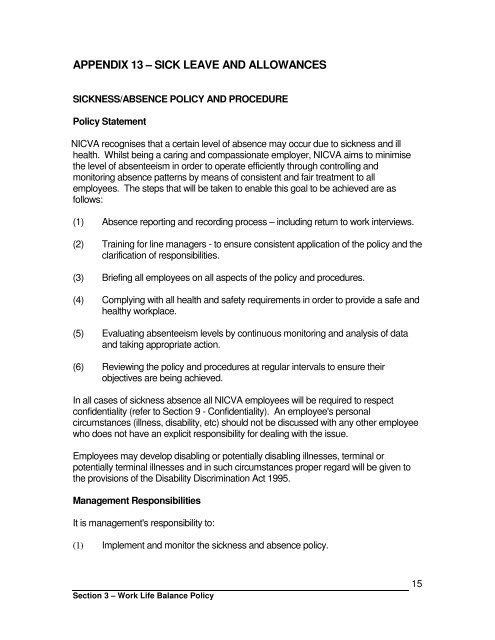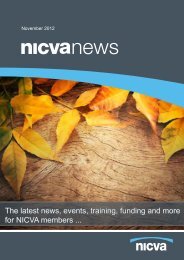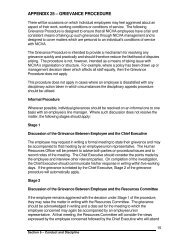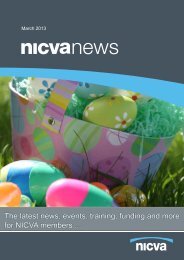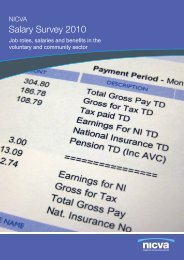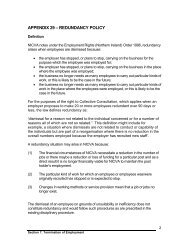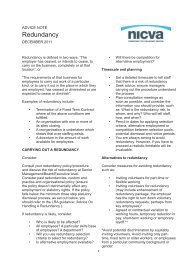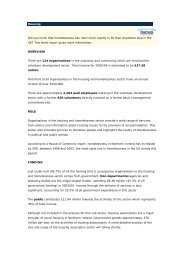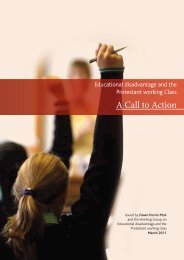APPENDIX 13 â SICK LEAVE AND ALLOWANCES - Nicva
APPENDIX 13 â SICK LEAVE AND ALLOWANCES - Nicva
APPENDIX 13 â SICK LEAVE AND ALLOWANCES - Nicva
Create successful ePaper yourself
Turn your PDF publications into a flip-book with our unique Google optimized e-Paper software.
<strong>APPENDIX</strong> <strong>13</strong> – <strong>SICK</strong> <strong>LEAVE</strong> <strong>AND</strong> <strong>ALLOWANCES</strong><br />
<strong>SICK</strong>NESS/ABSENCE POLICY <strong>AND</strong> PROCEDURE<br />
Policy Statement<br />
NICVA recognises that a certain level of absence may occur due to sickness and ill<br />
health. Whilst being a caring and compassionate employer, NICVA aims to minimise<br />
the level of absenteeism in order to operate efficiently through controlling and<br />
monitoring absence patterns by means of consistent and fair treatment to all<br />
employees. The steps that will be taken to enable this goal to be achieved are as<br />
follows:<br />
(1) Absence reporting and recording process – including return to work interviews.<br />
(2) Training for line managers - to ensure consistent application of the policy and the<br />
clarification of responsibilities.<br />
(3) Briefing all employees on all aspects of the policy and procedures.<br />
(4) Complying with all health and safety requirements in order to provide a safe and<br />
healthy workplace.<br />
(5) Evaluating absenteeism levels by continuous monitoring and analysis of data<br />
and taking appropriate action.<br />
(6) Reviewing the policy and procedures at regular intervals to ensure their<br />
objectives are being achieved.<br />
In all cases of sickness absence all NICVA employees will be required to respect<br />
confidentiality (refer to Section 9 - Confidentiality). An employee's personal<br />
circumstances (illness, disability, etc) should not be discussed with any other employee<br />
who does not have an explicit responsibility for dealing with the issue.<br />
Employees may develop disabling or potentially disabling illnesses, terminal or<br />
potentially terminal illnesses and in such circumstances proper regard will be given to<br />
the provisions of the Disability Discrimination Act 1995.<br />
Management Responsibilities<br />
It is management's responsibility to:<br />
(1) Implement and monitor the sickness and absence policy.<br />
Section 3 – Work Life Balance Policy<br />
15
(2) Maintain reasonable contact with the employee especially during periods of<br />
long-term sickness. The form of this contact will be sensitive and non-intrusive<br />
in approach and the frequency of the contact will depend on mutual<br />
agreement and the nature of the illness.<br />
(3) Ensure that disability, disabling or terminal illness issues are adequately<br />
considered and sensitively addressed when investigating sickness absence and<br />
implementing this procedure.<br />
(4) Ensure that all employees understand the notification and reporting procedures<br />
including those that relate to health and safety.<br />
(5) Monitor the sickness and absence policy in their area and forward all sickness<br />
and absence returns to the Manager.<br />
(6) Try to determine whether an employee's health is in any way affected by their<br />
work and where appropriate refer to and act on NICVA's Health and Safety<br />
Policy and Procedures in consultation with the employee and the Manager.<br />
Employee Responsibilities<br />
Employees have the responsibility:<br />
(1) To ensure their attendance at work, except when genuinely ill or unable to<br />
perform their work duties.<br />
(2) Not to undertake any task which may be adversely affecting their health.<br />
(3) To report any dangers or observed risks which may affect their or others’ health<br />
and safety at work.<br />
(4) To advise the Manager if they become aware that they have a disability or<br />
illness which is likely to affect their ability to attend work or perform some of their<br />
job tasks.<br />
(5) To adhere to the notification procedure.<br />
Absence Reporting and Recording Process<br />
On the first day of absence, the employee is responsible for:<br />
(1) Personally telephoning (as far as reasonably practicable) or ensuring contact is<br />
made with the line manager within an hour of the start of the employee's normal<br />
working day (10.00am at the latest) or if this is not possible, speaking to the<br />
Manager. Employees should not leave a message either on the answer<br />
machine or at switchboard. In the absence of the Manager or an employee’s<br />
Section 3 – Work Life Balance Policy<br />
16
line manager, the employee should speak to a Director or in their absence the<br />
Chief Executive. In the absence of any of the above they should speak to<br />
another Unit Head. Line managers have the responsibility of advising Human<br />
Resources of any absences.<br />
(2) Indicating when they expect to return or make contact.<br />
(3) Making contact at agreed regular intervals thereafter.<br />
Sickness Certificates<br />
(1) For a period of illness of up to one week, ie up to and including seven calendar<br />
days including weekends and bank holidays, employees should complete a selfcertification<br />
form and return it to the Manager immediately on their return to<br />
work.<br />
(2) For periods of illness exceeding one week, ie over seven days including<br />
weekends and bank holidays, a Doctor's Medical Certificate is required and<br />
must be forwarded to the Manager as soon possible.<br />
(3) In cases where an employee's sickness absence extends beyond the period set<br />
out in their Doctor's Medical Certificate they will be required to get another<br />
Doctor's Certificate or Hospital Certificate to cover the full period of absence.<br />
(4) In all extended periods of illness, NICVA may request, and shall have the right to<br />
require, an independent medical examination and report on the fitness of the<br />
employee.<br />
(5) Employees wishing to return to work after an extended certified period of<br />
absence must obtain a Doctor's note confirming they are fit to return.<br />
(6) NICVA reserves the right to withhold the payment of sick pay where employees<br />
fail to provide Doctor's Certificates when required to do so or provide false<br />
documentation. Managers should seek Human Resources advice under these<br />
circumstances.<br />
Unauthorised/Unnotified Absence<br />
When an employee is absent without following the notification and reporting procedure<br />
and without good reason, line managers will be responsible for informally investigating<br />
the absence and if appropriate referring to the disciplinary procedure. Advice must be<br />
sought from the Manager before any formal disciplinary procedure is initiated.<br />
Length of Sick Leave<br />
Section 3 – Work Life Balance Policy<br />
17
Subject to the conditions of this section an employee absent from duty as a result of<br />
sickness will be entitled in any one period of 12 months, to paid sick leave in<br />
accordance with the following table:<br />
Service at<br />
Full Normal Pay<br />
Half Normal Pay<br />
Commencement<br />
During 1 st year 1 month 1 month<br />
During 2 nd year 2 months 2 months<br />
During 3 rd year 4 months 4 months<br />
During 4 th /5 th year 5 months 5 months<br />
During 5 th year and<br />
subsequent years<br />
6 months 6 months<br />
This entitlement is subject to the proviso that not more than 12 months paid sick leave<br />
shall be taken in any period of four years or less, and not more than six months at full<br />
pay in any period of 12 months.<br />
Sickness entitlement is calculated on a rolling year basis. A rolling year is the year<br />
immediately preceding the start of a period of sickness. For example if sickness<br />
absence commenced on 4 September 2001 then sickness entitlement is calculated on<br />
the amount of sickness absence taken since 4 September 2000.<br />
In the case of part-time staff, the entitlement to sick leave is calculated on a pro rata<br />
basis. Entitlement is derived from the hours the employee normally works in a week as<br />
a proportion of the full-time entitlement.<br />
Employees will be given notice in writing by the Manager at least two weeks in advance<br />
of a transfer from full to half pay entitlement and of the half pay entitlement ceasing.<br />
All periods of paid sick leave will accrue annual leave entitlement. However, where an<br />
employee is prevented from taking annual leave because they are on sick leave, a<br />
maximum of five days annual leave may be carried over to the next leave year (in<br />
addition to the normal nine days) which must be taken within the first three months of<br />
the new leave year. All other annual leave not taken during a leave year for reasons of<br />
sickness absence will be forfeited.<br />
Although NICVA provides sick pay allowances as outlined above, it is legally obliged to<br />
maintain records of all absences due to sickness or incapacity in accordance with the<br />
Statutory Sick Pay Scheme (SSP). For this reason, it is important for staff to be aware<br />
of the need to notify all absences due to sickness or incapacity.<br />
Any queries regarding the operation of the Statutory Sick Pay Scheme (SSP) should be<br />
addressed to the Finance Manager.<br />
Referral to Occupational Health Medical Practitioner<br />
Section 3 – Work Life Balance Policy<br />
18
In order to provide managers with appropriate information about an employee's ability to<br />
perform all or part of their job tasks, and particularly in cases of long-term or excessive<br />
or persistent absence, NICVA may refer employees to an Occupational Health<br />
Practitioner. The purpose of the referral is to obtain information about an employee's<br />
condition which is necessary as part of the process of consulting with the employee and<br />
managing the absence.<br />
Typical situations where NICVA may refer to an Occupational Health Practitioner are<br />
when a prognosis is needed in relation to an individual's ability to return to work, an<br />
employee is nearing the end of their paid sickness entitlement, where stress may be a<br />
factor and where an additional medical opinion may be useful to the employee.<br />
All referrals will be made by the Manager and any information or correspondence<br />
relating to the case will be shared with the employee and will include NICVA obtaining<br />
consent from the employee for access to the relevant medical reports. However, by<br />
their nature, no two sickness absence cases are alike and therefore it is impossible to<br />
devise clear rules as to when referrals will take place.<br />
Return to Work Meetings<br />
On an employee's return to work following an extended period of sickness absence, the<br />
line manager will meet with the employee to discuss the reason for the absence and the<br />
progress of work in their absence. There may be exceptional circumstances when the<br />
manager will be requested to respect the confidential nature of sickness absence which<br />
will mean the employee is unwilling/unable to discuss the reasons for the absence. In<br />
these situations the manager is required to establish as a minimum whether the<br />
absence is in any way attributed to work or a result of work related injury. This meeting<br />
is essential for a number of reasons:<br />
(1) To ensure that the employee is fully informed of and kept up to date on issues<br />
within their unit of work.<br />
(2) To enable managers to identify at an early stage and take account of any<br />
sickness absence related problem areas which could have an impact on other<br />
employees’ work.<br />
(3) To ensure the employee has fully recovered and that appropriate steps are<br />
taken to ensure they are rehabilitated back to work.<br />
(4) To complete their sickness absence record form.<br />
All details discussed during the meeting will be held in strict confidence.<br />
Managers should be aware of the possibility that a disability or a disabling or terminal<br />
illness might be a cause for absence. If this is known or becomes apparent during a<br />
return to work meeting, the matter must be treated very sensitively and will require<br />
Section 3 – Work Life Balance Policy<br />
19
preliminary discussion with the employee about action or measures NICVA might be<br />
able to take to assist in the return to work.<br />
Persistent Sickness/Absence Reviews<br />
NICVA will monitor sickness absence on a quarterly basis against the UK average. The<br />
Manager will advise line managers when an individual employee's sickness/absence<br />
reaches a level that is considered to be unacceptable. If an employee's record involves<br />
frequent, patterned or persistent levels of absence, then the Manager or line manager<br />
will conduct an interview with the employee. This interview will aim to:<br />
(1) Clarify the frequency, pattern or persistence and identify the reason for the<br />
absence.<br />
(2) Ensure that the employee is aware that the absence record is giving cause for<br />
concern.<br />
(3) Advise the employee to seek proper medical attention if there is an underlying<br />
health problem.<br />
(4) Give consideration to the employee's personal problems/circumstances and<br />
explore possible methods of assistance.<br />
(5) Inform the employee that persistent short-term absences are unacceptable and<br />
that they may put continued employment at risk, ie disciplinary measures may<br />
be required.<br />
(6) Agree a reasonable period of time over which the employee's attendance can<br />
be monitored for improvement.<br />
(7) Indicate what the next step will be if the employee's attendance fails to improve,<br />
ie disciplinary measures may be invoked.<br />
Long-Term Absence<br />
NICVA recognises that some employees may be subject to periods of long-term illness<br />
where the employee is unlikely to be in a position to change the situation. In such<br />
instances NICVA will endeavour to be sensitive to the long-term needs of the employee.<br />
However, there are occasions where the needs of NICVA are such that appropriate<br />
action will be taken. In the event that an employee is absent through long-term illness,<br />
the following steps will be invoked after a period of two months:<br />
(1) The Manager will seek a meeting with the employee to discuss their current<br />
state of health and the likelihood of a return to work within a reasonable period.<br />
Section 3 – Work Life Balance Policy<br />
20
(2) At this meeting NICVA will seek to obtain written approval to contact the<br />
employee's GP in order to establish the likely length of absence and the longterm<br />
effect on the individual's capability in relation to job performance and<br />
attendance at work. (A copy of the GP's report will be sent to the employee and<br />
a follow up meeting will be held to discuss the reports.)<br />
(3) If the absence extends to a fourth month, NICVA will seek written approval for<br />
an independent medical assessment at NICVA's expense (again a copy of the<br />
report should be forwarded to the employee).<br />
(4) If the independent assessment indicates that a return to work within six months<br />
is unlikely, then the Manager will seek a further meeting with the employee.<br />
(5) If the absence extends to a tenth month, NICVA will seek approval for a second<br />
independent medical assessment at NICVA's expense (again a copy of the<br />
report should be forwarded to the employee).<br />
(6) If the second independent assessment indicates that a return to work within six<br />
months is unlikely, then a further meeting will be sought. The purpose of this<br />
meeting will be to consider future options which may include:<br />
(i)<br />
(ii)<br />
(iii)<br />
(iv)<br />
Any possible adjustments to work such as shortened days or weeks.<br />
Alternative employment.<br />
Early retirement on health grounds.<br />
Dismissal.<br />
(7) It is important at this stage to agree a timetable for considering the options<br />
above, usually two months, and to identify at this stage whether dismissal will be<br />
considered. This should be confirmed in writing with the employee and their<br />
trade union representative.<br />
(8) If over the course of the agreed timetable it becomes clear that an improvement<br />
in the foreseeable future is unlikely and other options have been exhausted, a<br />
further meeting will be arranged with the employee and their trade union<br />
representative to explain the company's decision to dismiss the employee for<br />
reasons of ill health.<br />
(9) The decision will be confirmed in writing giving the appropriate<br />
contractual/statutory notification and the procedure for appealing the decision.<br />
(10) If the employee's illness is terminal and there is a life assurance policy in<br />
operation (linked to a pension scheme), NICVA will endeavour to retain the<br />
employee so as to afford the employee's family consideration of benefits therein.<br />
Staying in Touch During Sickness Absence<br />
Section 3 – Work Life Balance Policy<br />
21
When an employee is away from work due to reasons of ill health, it is the responsibility<br />
of the line manager to provide cover for their work and to ensure that the employee has<br />
a break from work and related issues, as far as is practicable, to enable them to rest<br />
and recuperate. NICVA however has the right to contact the employee during their sick<br />
leave to enquire about their ill health or to deal with any urgent work related queries.<br />
For staff on long-term sickness (ie greater that one month), regular contact will be<br />
established by the Manager to check on their health and progress with recovery. The<br />
contact will typically be every two weeks and is likely to be by telephone, although<br />
discretion will be exercised after consultation with the employee and/or the Staff Union<br />
Representative particularly where the employee’s absence is due to stress or some<br />
other such illness.<br />
Sickness During Public Holidays<br />
When sickness falls on a public holiday or during a period of annual leave, employees<br />
will be entitled to time off in lieu, provided a doctor's certificate is produced. The doctor’s<br />
certificate should not be retrospective and employees should contact their line manager,<br />
Manager or another Unit Head to report the illness in the usual way. In the case of<br />
office closure, the employee should contact an appropriate person on their mobile or<br />
home number. If the employee is unable to make contact at this time, they should do<br />
so at the earliest opportunity.<br />
Absence for Reasons Other Than Sickness<br />
Routine dental and doctor appointments must be made as far as possible in the<br />
employee’s own time. Where this is not possible, routine dental and doctor<br />
appointments should be agreed with the line manager for the beginning or end of the<br />
working day or during lunch break. If an employee is likely to be absent for more than<br />
one hour of their normal working day, leave or time off in lieu must be taken by the<br />
employee. This will also apply to employees who are required to bring children or<br />
people in their care for appointments.<br />
Hospital appointments<br />
Time off for hospital appointments or treatments will be given to all employees provided<br />
an appearance at work is made prior to or after the hospital appointment where<br />
possible. An appointment card or letter must be shown to the employee’s line manager.<br />
Any subsequent absence associated with the hospital treatment/appointment will be<br />
recorded as sickness absence.<br />
Disability Discrimination Act 1995<br />
This Act applies to a person with a physical or mental impairment which has a<br />
substantial or long-term adverse effect on their ability to carry out normal day to day<br />
activities. If an employee becomes disabled or has a disability which worsens or<br />
Section 3 – Work Life Balance Policy<br />
22
develops into a progressive illness, NICVA will take all reasonable steps to make an<br />
adjustment to working conditions or to the working environment to overcome the<br />
practical effects of the disability.<br />
In all instances where an employee has a disability, medical or specialist advice will be<br />
obtained on how best to accommodate the disability.<br />
Early Retirement on Ill Health Grounds<br />
If an employee is a member of the NICVA pension scheme with a minimum two years<br />
pensionable service, and is permanently unfit to do their job due to ill health, early<br />
retirement on ill health grounds is an option that can be considered. This will only take<br />
place after all other options, including that of alternative work, have been exhausted.<br />
Although an individual can apply for early retirement, the decision to authorise ill health<br />
retirement is a management one based on medical opinion. In addition the Trustees of<br />
the pension scheme must agree to all ill health early retirement requests.<br />
Section 3 – Work Life Balance Policy<br />
23


